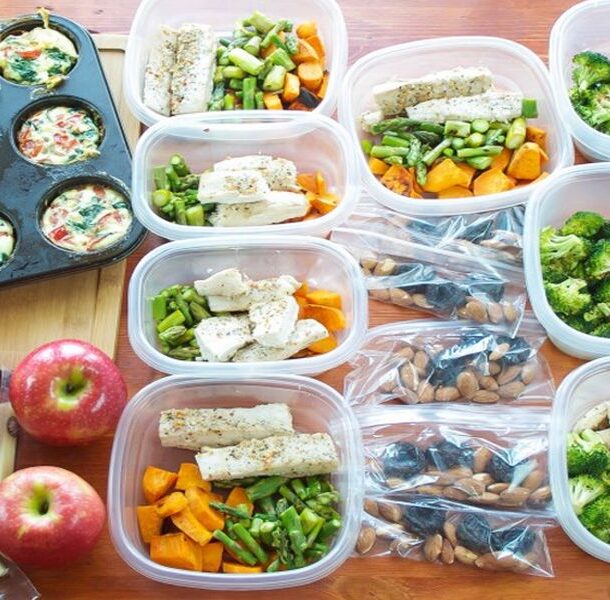In today’s fast-paced world, work, family and everyday life often leave little time for cooking. Learn about the benefits of weekly meal prepping. The result Frequent visits to fast food restaurants, take-out meals and unhealthy food choices. But what if there was a solution that not only saved time but also promoted healthier eating, saving resources and more control over what you consume? Enter the world of weekly meal prepping, a practice that has gained popularity for all the right reasons.
In this article, you will discover the many benefits of preparing and planning meals for the week. From the convenience of time-saving strategies to the significant financial benefits. to promote healthier and more nutritious foods We examine the compelling reasons why meal prepping has become a lifestyle choice for many. We will also discuss its positive impact on reducing food waste. The potential to create diverse and interesting menu options and the ability to adapt to a variety of dietary needs.
Discover how preparing meals in advance can not only simplify your daily routine, but also contribute to your well-being, wallet and overall quality of life. Learn how convenience goes hand in hand with health and financial wisdom.
Advantages of cooking lunch boxes for the week
1 – Time Savings:
Preparing your meals in advance, also known as meal planning, can save you a lot of time during the week. Instead of spending hours in the kitchen every day, you can set aside just a few hours on the weekend to prepare your meals for the entire week. This means less time spent chopping, cooking and cleaning up after each meal. This means you have more time to focus on other activities, such as work, family or personal hobbies. Meal prepping streamlines your daily routine and reduces the stress of making last-minute decisions about what to eat.
2 – Portion Control and Nutritional Management:
Meal prepping allows you to have better control over portion sizes and the nutritional composition of your meals. You can plan your portions according to your dietary needs, ensuring that you are consuming the appropriate amount of calories, macronutrients and vitamins. This level of control is especially beneficial if you have specific dietary requirements or health goals to meet. It also helps you avoid the temptation to overeat or opt for unhealthy alternatives when you are hungry and in a hurry. By preparing your own meals, you can create balanced and nutritious meals that are aligned with your health and wellness goals.
3 – Minimize Food Waste:
Meal prepping is an effective way to reduce food waste by helping you use ingredients more efficiently. You can plan your meals based on the items you already have in your kitchen, avoiding unnecessary purchases of perishable foods. In addition, it is worth using leftovers from one meal to make other meals, ensuring that no food is thrown away. By being conscious about your food use, you not only save money, but you also contribute to environmental preservation by reducing the amount of food wasted in landfills.
4 – Save Money
One of the most attractive advantages of planning your meals for the week is the potential for significant savings. Eating out or ordering food every day can be quite expensive. By preparing your own meals in larger quantities, taking advantage of promotions, and avoiding food waste, you can save a lot of money. Over time, these savings can add up, making meal planning a cost-effective choice. It’s also important to note that by doing so, you have full control over your food budget, allowing you to make healthier choices while still being more cost-effective.
5 – Special Diet Adaptability:
Meal planning is particularly beneficial for people with special dietary needs. Whether you’re following a specific diet, have food allergies, or are on a weight loss plan, meal planning allows you to customize your meals to your specific needs. You can prepare meals that are suitable for gluten-free, vegan, ketogenic, or other dietary restrictions. This level of customization ensures that you can maintain a healthy and satisfying diet while still following your dietary preferences and restrictions.
6 – Variety of Possibilities:
Meal planning doesn’t necessarily mean eating the same thing every day. In fact, it offers an opportunity to explore creativity and enjoy a wide variety of cuisines. You can prepare a variety of dishes by experimenting with different cuisines, flavors, and ingredients. This diversity can make mealtimes more exciting and help you avoid food boredom. Whether you’re a fan of Mexican, Italian, or Asian cuisine, meal prepping allows you to enjoy delicious and diverse options throughout the week.
7 – Healthier Eating:
By promoting a balanced diet, meal prepping promotes healthier eating habits. By preparing your own food, you have control over the quality of the ingredients you use, allowing you to make nutritious choices that include a variety of fruits, vegetables, lean proteins, and whole grains. In addition, you can reduce the amount of unhealthy additives, as well as excess salt and processed foods in your diet. Meal prepping allows you to focus on a balanced, healthy, and nutritious diet, ultimately contributing to your overall well-being.
Disadvantages of Preparing Weekday Meals
Preparing your meals for the entire week in advance can be a convenient and time-saving strategy, but it does have its drawbacks. In this article, we’ll explore some of the disadvantages associated with weekly meal prep. While there are benefits, it’s important to consider the potential drawbacks as well.
1 – Upfront prep time:
One of the main disadvantages of prepping your meals for the week is the significant investment of time required in advance. It’s crucial to dedicate several hours in a single day to ensure that your meals stay fresh and tasty throughout the week. This can be especially challenging for people with busy schedules, as finding ample time to cook can be a daunting task. Additionally, the upfront prep can be overwhelming, especially for those who are not experienced in cooking large quantities.
2 – Potential kitchen space constraints:
An additional challenge when dealing with weekly meal prep is the amount of space it can take up in your kitchen. To prepare and store multiple meals for the week, you need ample counter space and access to a variety of utensils and equipment. In smaller or shared kitchens, this can be especially problematic. A crowded workspace can cause frustration and discourage some from adopting a meal prep routine.
3 – Importance of Proper Transportation:
Once you have prepared your meals for the week, you will likely need to transport them to work or other places where you will be eating. This adds an additional layer of complexity, as you will need to use appropriate containers to ensure that your meals do not spill or get damaged during transport. In some cases, you may also need to use an insulated bag or cooler to keep your meals at a safe temperature. For people who travel daily or have flexible schedules, the need for adequate transportation can present a logistical challenge.
4 – Need for adequate storage:
Another disadvantage of weekly meal prep is the need for storage space and containers.
Cooked meals must be stored in a manner that prevents spoilage and maintains food safety. This means investing in a variety of containers, such as airtight containers, to keep different foods fresh. Improper storage can lead to bacterial growth and spoilage, making all your prep efforts unnecessary. Not everyone has enough storage space, which can make this aspect of meal preparation difficult.
5 – Loss of Freshness:
Over time, even well-prepared meals lose their freshness. Foods can become less appealing and their texture can change, especially when reheated. While proper storage can slow this process, it is difficult to maintain the same level of freshness compared to freshly prepared meals.
Some ingredients, such as salad greens, can wilt; the flavors of dishes can blend over time. As a result, this can end up being a disappointing experience for those who value food and the quality of their meals.
6 – Possible lack of variety:
One of the most common complaints about weekly cooking is the limited food choices during the week. When you prepare and pack meals in advance, you often end up eating the same foods over and over again. This can lead to boredom and dissatisfaction with meals, as people often enjoy different flavors and textures in their daily meals. Lack of variety can also make it difficult to maintain a cooking routine in the long term, as the monotony of the same meals can become tiresome.
7 – It requires advance planning:
Effective weekly cooking requires careful planning and organization. This means choosing a menu, making a shopping list, and making sure you have all the necessary ingredients and utensils before you start cooking. If you don’t like planning or if your schedule is unpredictable, the need to plan ahead can be a major disadvantage. Poor planning can lead to hasty choices and a poorer cooking experience.
In conclusion, while there are many advantages to cooking every week, it’s important to consider the potential disadvantages. The need for advance planning, potential kitchen space limitations, and the need for adequate transportation are all factors that can make the cooking process difficult. Understanding these disadvantages and finding strategies to mitigate them can help you make the most of your weekly cooking while minimizing the disadvantages. Ultimately, your success in the kitchen depends on your individual circumstances, preferences, and ability to adapt to the challenges that come with it.

